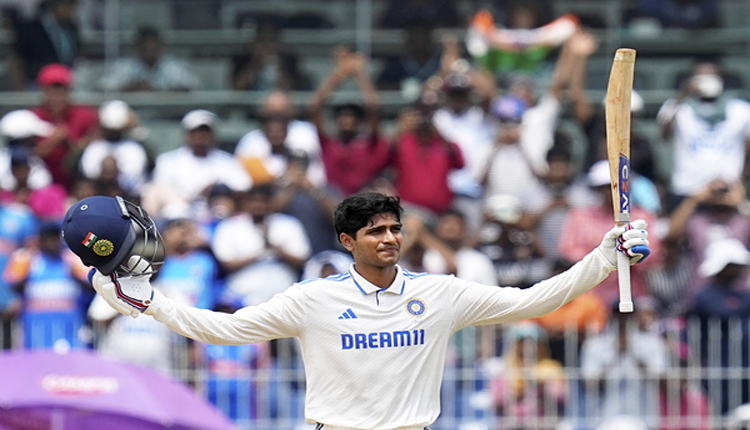Chennai: Test cricket is a gruelling format, where performing consistently over multiple innings is no easy feat. Not every player manages to reach the coveted milestone of 50 or 100 Tests, and for those who do, it’s a result of persistent hard work and adaptability. Shubman Gill, touted as the future of Indian cricket for the past four to five years, has been slowly cementing his place in the Test side, although not without challenges. His talent has always been undeniable, especially in the limited-overs format, but Test cricket has presented different hurdles for the young batsman.
Despite some difficulties in his Test career, Gill has displayed a remarkable knack for thriving in the second innings, an aspect of his batting where even seasoned players have struggled. His recent performance against Bangladesh in the Chennai Test only adds to his growing reputation as a master of the second innings.
On the third day of the Chennai Test, Gill played a magnificent unbeaten innings of 119 runs, scoring his century in India’s second innings, which was the third innings of the match overall. This achievement stands out because batting in the second innings of a Test, particularly on the subcontinental pitches, is far from easy. By the time the third or fourth innings rolls around, the pitch tends to break down, making it easier for spinners and trickier for batsmen to hold their ground.
This difficulty explains why big scores are often rare in a team’s second innings, but Shubman Gill has proven to be an exception. Throughout his 26-Test career, he has often struggled in the first innings, as seen in Chennai where he was dismissed without scoring after just 8 balls. Critics were quick to pounce on his failure, but they seemingly forgot Gill’s exceptional track record in the second innings.
The statistics back him up. Since his debut on the 2020-21 tour of Australia, Gill has consistently performed in the latter stages of matches. His first half-century came in the famous Brisbane Test, where he scored a crucial 91 runs while chasing down a historic target in the fourth innings. That performance hinted at his ability to rise to the occasion when the stakes are highest.
Gill’s first century in Test cricket took longer to arrive but when it did, it too came in the second innings—against Bangladesh in December 2022, where he scored 110 runs in the third innings of the match. His success didn’t stop there. Despite some struggles earlier this year against England, Gill made a statement in the Visakhapatnam Test, scoring 104 runs in India’s second innings. He followed that up with a 91 in Rajkot and an unbeaten 50 in Ranchi, both in the second innings.
A deeper look into his stats paints a clearer picture. In 26 Test matches, Gill has batted 26 times in the first innings, scoring 744 runs at a modest average of 28.61, with only two centuries and two half-centuries. However, in the second innings, he has batted 22 times, accumulating 867 runs at an impressive average of 51, including three centuries and four half-centuries.
Comparing Gill’s second-innings record to some of the best in modern cricket highlights just how special his performances have been. For example, Indian stalwart Virat Kohli has scored 2734 runs in second innings at an average of 37.97, with five centuries and 16 half-centuries. Similarly, Australia’s Steve Smith has scored 2785 runs at an average of 39.22, with four centuries and 19 half-centuries. In this light, Gill’s second-innings prowess becomes all the more striking.
Shubman Gill’s ability to deliver in the most challenging phases of a Test match shows that he is not just a promising young cricketer but a player with the resilience and mental strength required for long-term success in the longest format. As he continues to develop his skills, his dominance in the second innings could be the key to his eventual rise as a stalwart of Indian cricket.



Comments are closed.